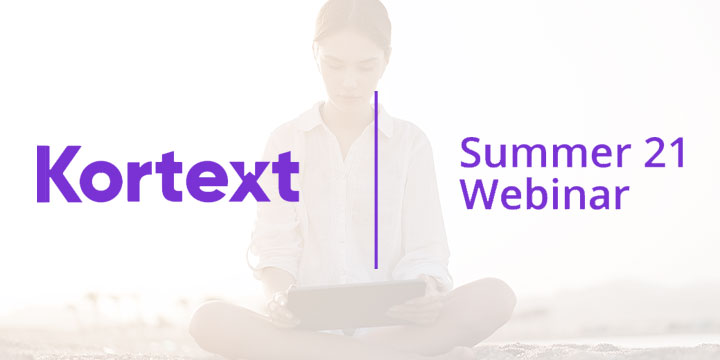Catch up on the Kortext Summer 21 Webinar!
Nothing screams summer like a bucket, spade, and a webinar.
Wait, what?
Okay, you got us! But it’d be rude not to celebrate the success of our summer webinar!
On Tuesday 8th June, we hosted academics, librarians, students and more, at our Kortext Summer 21 Webinar on Microsoft Teams.
Opening the event was Kortext’s CEO, James Gray, acknowledging that we were on our “Fifth or sixth day of summer”…
A home truth after weeks of perpetual rain in Bournemouth.
James went on to say: “It’s been intriguing seeing engagement based around learning patterns and collaboration… it plays to the point where we integrate content into the experience.”
Before welcoming on our keynote speaker, James posed the rhetoric of:
How can the component of student engagement tie back into university support mechanisms that really help drive student progression and outcomes?
Our keynote speaker, Dr David Kellermann, joined the webinar all the way from down under. By day, Dr Kellermann is a senior lecturer and digital teaching and learning advocate, and by night, he is producing incredible presentations for webinars.
(Well, we can’t actually confirm this is actually true, but it was true on June 8th 2021…)
Dr Kellermann began by letting us know it was 11.30pm in Australia, which made what followed in his presentation all the more amazing.
Expressing his familiarity with the UK higher education system, Dr Kellermann said:
What I want to talk to everyone about is the model of collaborative learning in the modern workplace. It’s not just to do with giving students access to the content… we need to integrate it into the learning experience.
We’re having a meeting on Teams right now, why don’t we teach students in the environment where we work?
During his presentation, Dr Kellermann ran through his standard lecture procedure, and when we say standard, it’s incomparable to the experience that I had as a student in the UK.
Marketing Director, Robin Gibson said:
I’ve worked at ITN. What Dr Kellermann is doing right now is just a 6pm news bulletin, short of gongs!
If you can’t tell, we were infatuated by Dr Kellermann’s keynote presentation. You can (and really must) watch it in its entirety by clicking here.
Following on from Dr Kellermann were Dr Sarah Jackman, Senior Lecturer, University of Exeter and James Anthony-Edwards, University Librarian, University of Exeter.
After an introduction and establishing the current landscape, Dr Jackman launched in and said:
As we move forward, things are ever-changing, we’re not sure where things are going. The idea is to look at what students enjoyed before and after covid and how we can best move forward.
Complementing this, James said:
Our route for next year is juggling the physical and the digital. One of the things we found really hard this year, and will continue to find hard is, we’re talking hybrid.
After the dynamic duo from University of Exeter, Dr Stephen Wilkinson from University of Buckinghamshire was asked:
Do you see the traditional structures in the universities changing, and how does that impact and effect faculty, and academic students?
To which he answered:
I’m speaking from a very small university, we have 3,000 students in total. The ramifications brought up are onerous for us. How bigger institutions cope with this are going to be very interesting to see.
One of the things we’ve been trying to incorporate across the university is an e-portfolio of skills that they progress over their degree…
There’s a sense now of this hybrid situation…. We’re kind of in a limbo – not knowing what direction we’re going to take.”r
At the event, we were also joined by James Yanchak, from publisher Taylor and Francis.
Commenting on the trajectory of digital content, James said:
Taylor and Francis has been looking at how we can target individual components within our titles to specific markets to specific consumers.
You will see a gradual shift away from the bound book towards more of a data service. The biggest problem has been that the systems to consume that still need further development.”
One of our webinar regulars, and UEL’s very humble answer to Dr Kellerman, Ionel Ursu was asked:
When you look at the delivery of a quality digital experience for all students, how do you think of that in the content of accessibility, how do you think about that in the content of ensuring equality of access, and equality of delivery?
Taken aback by the big question, Ionel said:
Um, hi everyone!
It’s a very tricky question because it all comes down to how the content is created at the creation stage.
It’s really difficult to design content based off a multitude of platforms – from 5-inch screens in someone’s hands to the 27-inch screens that some people have”
I bet you’re thinking: “Is… is that it?”
No, it’s not at all, there was so much more that you missed, but it’s okay, you can catch up on the highlights reel, bringing you some of the best bits.
We say ‘some’, because it was all the best.
If you want it all, click here for the full recording.

